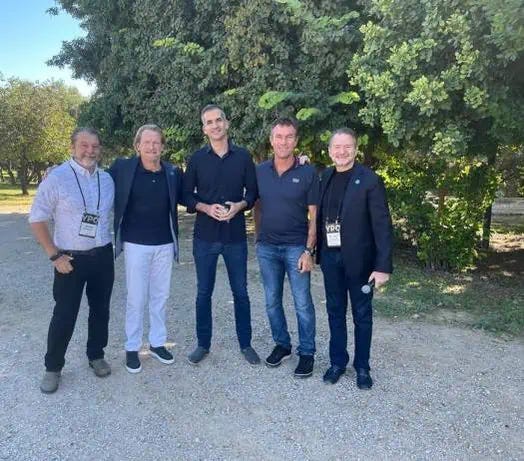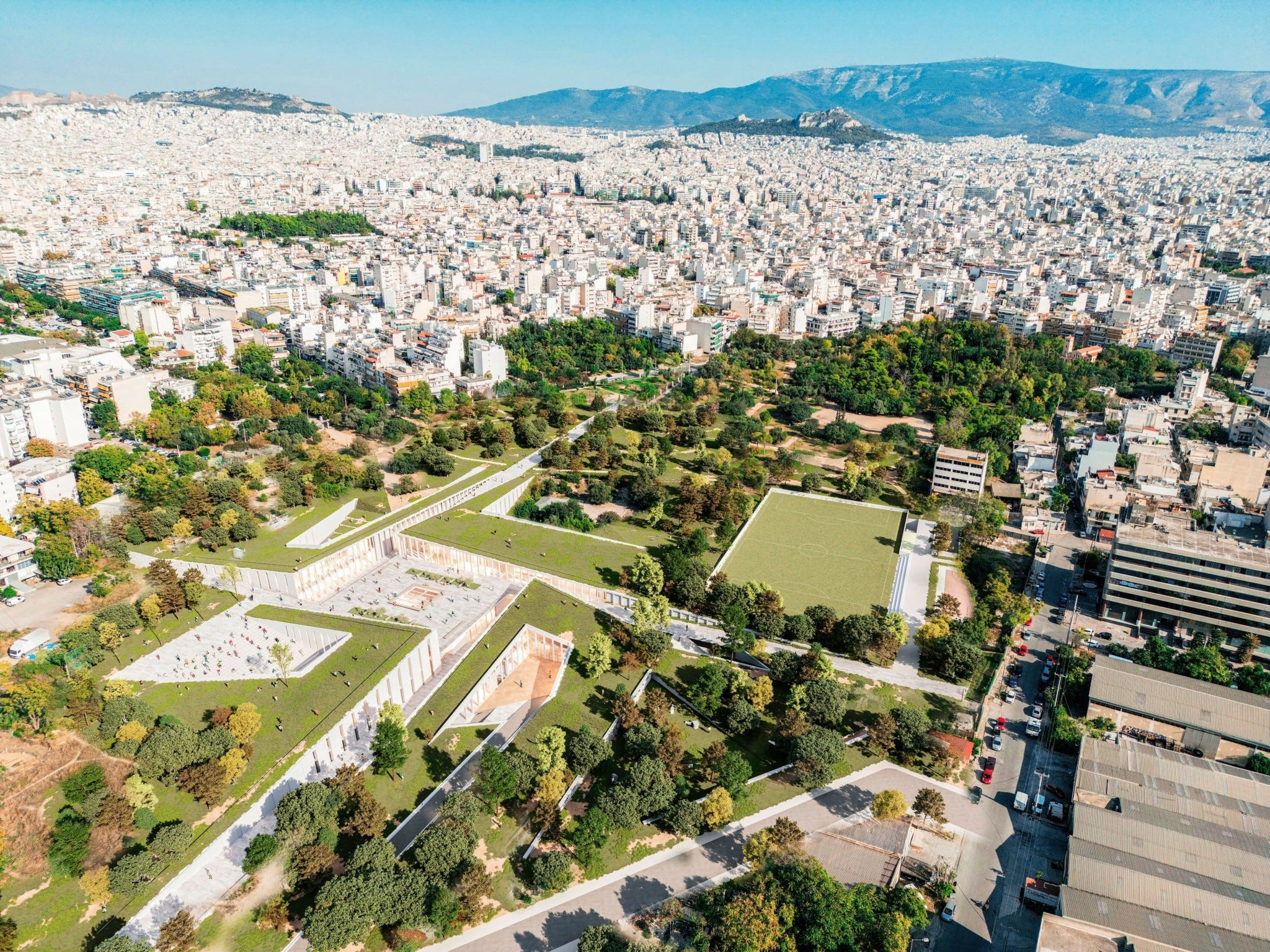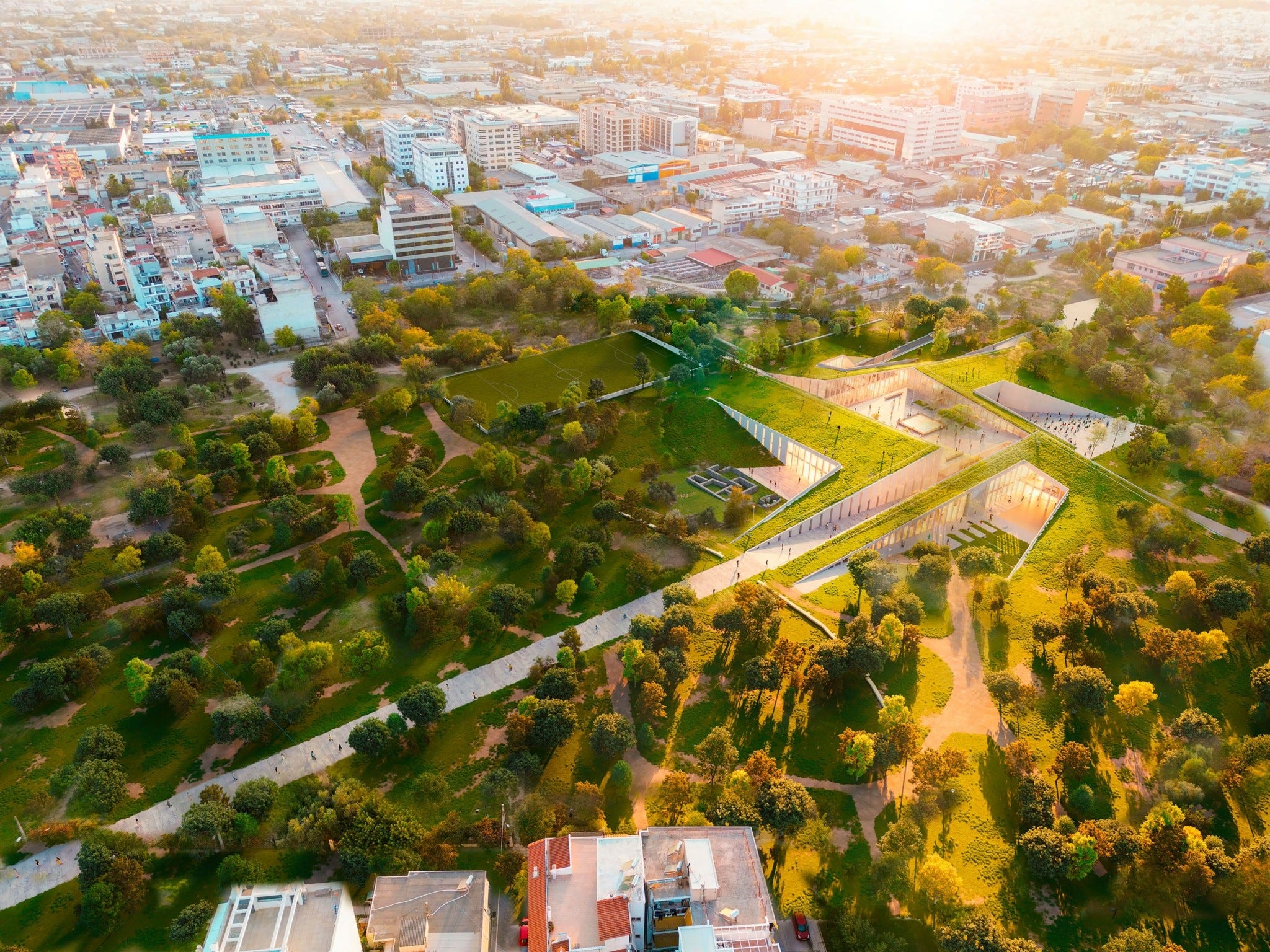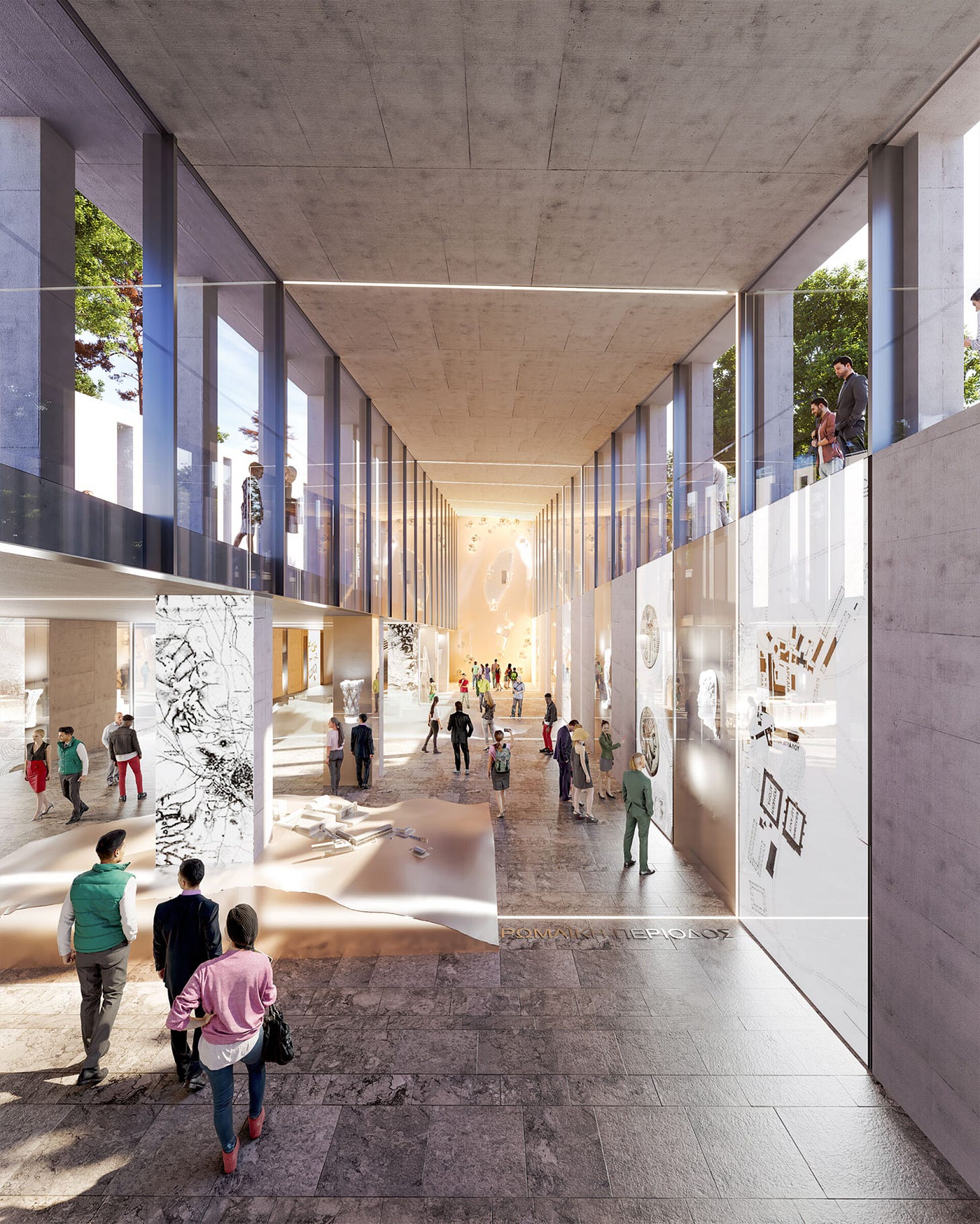The ancient home of Plato’s Academy is getting a major facelift! Exciting plans have been announced for the new Archeological Museum of Athens, to be located in the Akadimia Platonos suburb of Athens. The architect firm of Giorgos Tsolakis won the municipality’s design competition with their innovative proposals, which envisage a semi-underground building integrated with the landscape of the Plato’s Academy Park, as pictured below. (As reported in the Greek news media; images below from NewMoney and Athens Voice.)
The New Archeological Museum
Every modern “academy” bears the name of the original Academy school, founded here by Plato. Today the Athenian suburb of Akadimia Platonos contains a public park, where locals walk their dogs and take their children to play. It contains the exposed ruins of a palaestra, or wrestling school, and other ancient buildings. We know Plato owned a house here and taught philosophy in the park, which became synonymous with his school of philosophy. His masterpiece the Republic is believed to have been written here. Plato’s body was also eventually buried here, and his remains are probably still under the ground in the park.
For centuries, Greece was the cornerstone of Western philosophy. To walk where philosophy originated, to walk in the footsteps of Plato and Socrates is to imagine how this tradition began. — Donald Robertson, president of Plato’s Academy Centre, quoted in the Stanford Social Innovation Review
Our own project, The Plato’s Academy Centre (PAC), is likewise a nonprofit (AMKE) registered in Greece, which aims to promote ancient Greek philosophy online, and in Athens. It is currently raising funds to buy property in the vicinity of the Akadimia Platonos park, in order to create an international conference centre, as part of a separate proposal, which complements plans for the new museum.
The new Archeological Museum of Athens will explain the evolution of the city of Athens, from a small original settlement into the great historic city that it became. It will exhibit archeological findings from excavations, such as those uncovered during building and subway construction.
The renovation program absolutely respects the historicity of the space and revives the spirit of the Platonic Academy for the simultaneous education of the spirit and the body. – Lina Mendoni, Greek Minister of Culture and Sports, quoted in Athens Voice
The design aims to enhance the urban environment of modern Athens by improving one of the “green lungs” of the city, the Akadimia Platonos park, the very spot where Plato’s original Academy was located.
The plans for the new Archeological Museum of Athens involve a partially underground structure, designed to preserve the green space, which once contained the famous groves where Socrates, Plato, and Aristotle, would walk among trees and by athletes training, in order to discuss philosophy.
So we have a museum from which these four axes come and meet in the central square. They start from the four points of the horizon, giving the feeling that everyone can come from everywhere to this museum. So it is a museum that opens its doors to all its visitors. – Giorgos Tsolakis, quoted in NewMoney
Visitors to the park are able to walk in the footsteps of ancient Greek philosophers, a short distance from the city centre and the ancient Athenian Acropolis.
The architect, Tsolakis, has explained that his firm’s vision is intended to benefit the park, ensuring that it receives “the care it deserves”, while also helping urban renewal in the Akadimia Platonos suburb, inspiring new uses for buildings and improvements to the surrounding area.
I believe that such a museum will revitalize the area. Not simply because it will bring people to the park. This is obvious. The essential thing is that it will play the role of a catalyst for the development of the region. Around such an important building, a museum about the city of Athens, various similar uses are slowly being developed, upgrading the area as a whole. – Giorgos Tsolakis, quoted in NewMoney
These plans, and the mock-ups published in the Greek news media, are very impressive and seem likely to help what had become a poorer suburb of Athens, in need of investment and urban renewal.
The Plato’s Academy Centre
These plans for the new museum will bring many more visitors to the park in future years, and create an ideal environment for other cultural projects in the area, including those of our own Plato’s Academy Centre.
The Plato’s Academy Centre is running regular virtual events about the modern applications of ancient Greek philosophy, throughout the year, featuring renowned academics and authors. In September 2022, it also helped the Aurelius Foundation and YPO to organize a major four-day event on Stoicism in Business, in Athens, including a mini-conference in the centre of Plato’s Academy Park.

The event was attended and supported by Adonis Georgiadis, the Greek Minister of Development and Investment; Kostas Bakoyannis, the Mayor of Athens; and James Tsunis, the US Ambassador to Greece. Lina Mendoni, the Minister for Culture and Sports, was out of the country at the time, but kindly sent a letter of support.
Organizing “Stoicism in Business” in Athens, the womb of classical Greek culture, hosted by the Aurelius Foundation and the YPO, combines and connects humanities with business in an exemplary and original way. In recent years, more and more successful business executives, organizational and administrative managers are expressing a strong interest in humanities and especially philosophy. […] I welcome you to Athens, the city whose history of thousands of years is everywhere visible and legible. I would like to warmly congratulate the initiators and organizers of this inspiring conference and wish you success in your endeavours. — Lina Mendoni, Greek Minister for Culture and Sports
The Plato’s Academy Centre project was also featured in the Fall 2022 issue of the Stanford Social Innovation Review (SSIR). SSIR is an award-winning print and digital magazine publication, and website, covering cross-sector solutions to global problems. It was launched by the Center for Social Innovation (CSI) at the Stanford Graduate School of Business, and is currently published at the Stanford Center on Philanthropy and Civil Society (PACS).
If you’re interested, you can help support our project in a number of ways. See our website platosacademy.org for more information, or to get in touch.











So tres bien fait!🎉